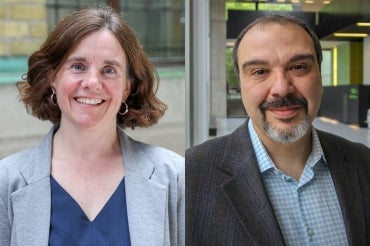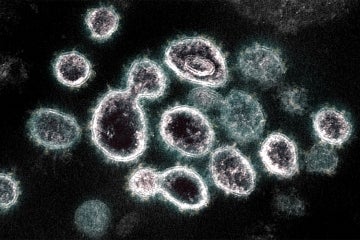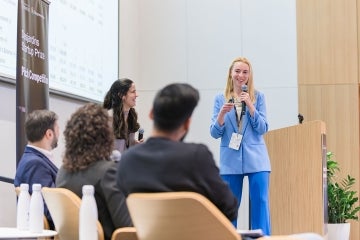Two U of T professors honoured with President’s Teaching Award

Published: May 31, 2019
Michelle Craig’s work to improve and enhance learning materials in computer science has been internationally recognized. Paul Piunno’s teaching innovations have introduced undergraduate science students to interdisciplinary research.
The two University of Toronto professors, who have devoted their careers to enhancing the student experience, have been awarded this year’s President’s Teaching Award. The award recognizes sustained excellence in teaching, research in teaching and the integration of teaching and research.
“Professors Craig and Piunno have brought great energy and creativity to their classrooms, enriching the education of our students and setting an inspiring example for other teachers,” said U of T President Meric Gertler.
“On behalf of the University of Toronto, I congratulate both of them on their achievements and on receiving this important recognition.”
Winners of the teaching award receive an annual professional development allowance of $10,000 for five years, and are designated members of the U of T Teaching Academy for a minimum period of five years. The academy meets regularly to discuss matters relevant to teaching, offer advice to the vice-president and provost, as well as the director of Centre for Teaching Support & Innovation (CTSI).
Read about last year’s winners
Craig, an associate professor, teaching stream, in the department of computer science, is particularly excited to begin contributing to the U of T Teaching Academy.
“It means you have an opportunity to have a bigger impact on what we do here and raise the portfolio of teaching at the university,” said Craig, who joined U of T in 1990.
Craig has been active in transforming computer science material for various audiences. She co-ordinated the cross-Canada Undergraduate Capstone Open-Source Projects program (UCOSP) to train promising software developers and the Computing for Medicine program to introduce computing to medical students. She is currently working with the National Center for Women & Information Technology to develop EngageCSEdu, a peer-reviewed online repository for teaching materials. “A place for teaching-stream faculty to publish resources,” said Craig.
She is most proud of her work in developing educational materials, leading a team that produced over 125 videos and over 200 exercises about C and Systems Programming that have been viewed thousands of times by U of T students.
She couldn’t do it alone, and said she was thankful to collaborate with many across her department.
“The thing I’m most proud of was getting a whole bunch of people to agree to work on this stuff together,” said Craig, who read on camera for each video while other faculty and students filled in as script writers, editors and videographers.
She believes strongly in producing high quality materials for her students. Collaborating on over 35 publications in computer science education, Craig also takes pride in applying scholarly rigour to her teaching methods and materials.
“Assignments and curricular materials are what makes the student experience,” said Craig, who won an Ontario Confederation of University Faculty Associations teaching award. Having a good relationship with students is important, she added, but “what makes the student’s experience in computer science is how well the materials guide them through the lessons and how frustrated they are when the instructions aren’t careful.
“If they can get from Step A to Step B, and actually meet the learning objectives – and it hasn’t been too painful – that’s what I want to invest in.”
Paul Piunno, an associate professor, teaching stream, in the department of chemical and physical sciences at U of T Mississauga, is also invested in engaging students and has done so through his team-based interdisciplinary pedagogy.
Collaborating with colleagues in the department of biology and the department of chemical and physical sciences, Piunno launched the Advanced Interdisciplinary Research Laboratory (AIRLab) in 2012. An alternative to the traditional fourth-year independent research thesis course, AIRLab teams up students from different scientific disciplines – including chemistry, biology, physics and Earth sciences – and assigns a research problem related to their unique skill sets. The teams are given an academic year to work on the project.
What makes AIRLab effective, Piunno said, is that it teaches students about what to expect in their future careers. “As much as we all think we’re training every student in our course to go to grad school and pursue a master’s and a PhD, a lot of students aren’t going to grad school – a lot of them are going into industry,” said Piunno.
What’s very important to industry, he said, is critical thinking skills and the ability to work across disciplines, to “mesh as a team.” Piunno designed AIRLab with that in mind, drawing on his prior experience working with a U.S.-based life sciences company.
“I had to get out there and put together a team of mechanical, optical, electrical and software engineers – I had a biology team and chemistry team and nobody on the team spoke each other’s language,” said Piunno, who worked on a patent for an RNA diagnostics tool as a PhD student.
“In order to pull off this commercialization endeavor, they all had to jump in and row the boat in the same direction.”
Drawing on that industry experience, and the need for teamwork and communications skills, Piunno wishes he had the skills he teaches his students when he was starting out.
“A lot of the real-world challenges come from problems that have to address multiple disciplines, and you need multiple people to come together,” said Piunno, who has also developed a second-year interdisciplinary course that introduces field-based scientific research to undergraduates.
Piunno is humbled to receive a President’s Teaching Award.
“This is a crescendo of everything I’ve experienced throughout my career,” said Piunno. “The imposter syndrome is kicking in pretty hard right now.
“I just enjoy doing what I do, and doing the best I can to be that professor that inspires, encourages and is always enthusiastic – and by that same token, hold my students to high standards and make sure that they’ve worked for their credit and learned something.”
Five new University Professors
U of T also announced faculty who were newly promoted to University Professor, the highest rank for faculty at the university. The honour recognizes “unusual scholarly achievement and pre-eminence in a particular field of knowledge.”
The new University Professors are:
- Elizabeth Edwards, department of chemical engineering and applied chemistry and the department of cell and systems biology
- Prabhat Jha, Dalla Lana School of Public Health
- Anita McGahan, Rotman School of Management
- James Retallack, department of history
- Frances Shepherd, department of medicine



